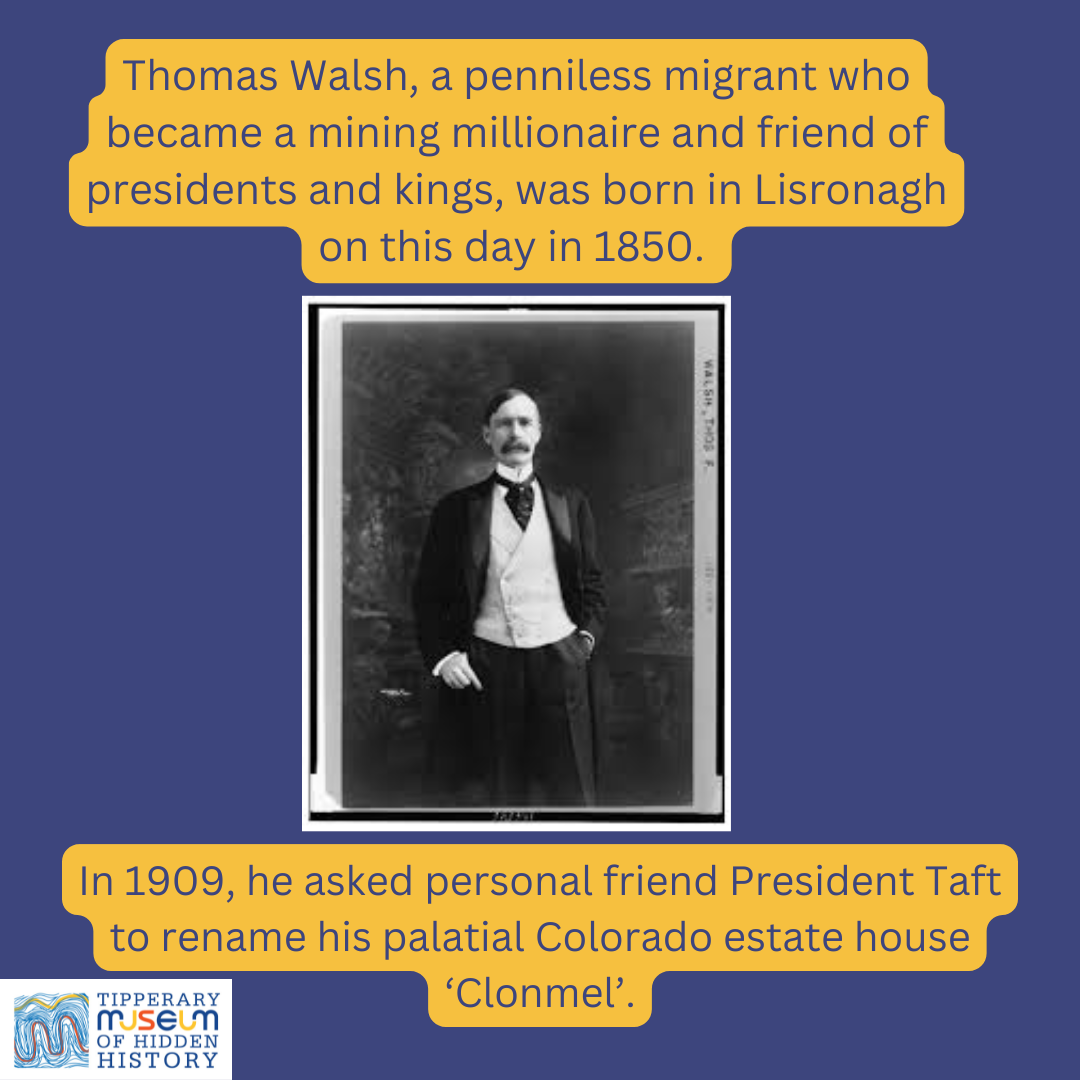Thomas Walsh, a penniless migrant who became a mining millionaire and friend of presidents and kings, was born in Lisronagh on this day in 1850.

Thomas Walsh was born in Baptistgrange, Lisronagh on 2nd April 1850. He was the second youngest of four boys and two girls born to small farmers Thomas and Bridget Walsh. Tom’s mother died young and, after an apprenticeship as a millwright with the Grubbs in Clonmel, Tom emigrated to the US in the late 1860s with his father and sister.
After three years in Massachusetts, Tom headed west to seek his fortune and he was not long in catching ‘gold fever’. In 1877, he arrived in Leadville, Colorado, one of the great mining towns of the West, yielding substantial deposits of lead and silver. It was here that he met Carrie Bell Reed from Alabama and they married on 7 October 1879.
It was 1896 when Tom Walsh returned home after a day gold prospecting and said to his daughter Evalyn, “daughter, I’ve struck it rich”. He had discovered a lucrative gold vein nine miles from where he lived in an area which was thought to have been worked out. He kept it a secret until he had bought up all surrounding mining claims that had been abandoned and he ended up owning 900 acres of rich ore-bearing mountain. He named it Camp Bird mine after the noisy blue-jay birds that inhabited the area.
By the following year, the mine was producing $4,000 worth of gold a day and it was not long before Camp Bird was churning out a fortune, making Walsh a millionaire several times over. His new-found wealth propelled him and his family into the upper echelons of American society. He socialised with presidents and kings, and toured Europe where President McKinley had appointed him American Commissioner to the Paris Exhibition in 1898.
At the end of the European tour, he returned home to Clonmel and visited his mother’s grave. The Walsh’s rented out most of the Ormonde Hotel on Gladstone Street. Despite the fact that the Walsh’s had meet King Leopold of Belgium and the Sultan of Turkey amongst others on their trip, Evalyn later claimed that ‘the whole of our journey was simply part of a pilgrimage to Tipperary.’ It was to be Thomas Walsh’s last visit home.
In 1902, Walsh sold Camp Bird mine in a multi-million dollar deal. The previous year, he had purchased a sixty-roomed mansion on Massachusetts Avenue, Washington DC for $835,000. The ‘Walsh Palace’ was designed to impress. A New Year’s Eve party, described in the New York Times, stated that 325 guests consumed 480 quarts of champagne, 288 fifths of scotch and 40 gallons of beer. Today, the building is the Indonesian Embassy to the United States. 1909, President William Howard Taft visited Walsh’s estate in Wolhurst, Colorado. There, in the presence of 300 selected guests, Walsh asked his friend the President to rename his palatial estate house ‘Clonmel’.
Walsh is remembered as an unassuming a philanthropic man who treated his employees well. His Camp Bird mine, which employed 500, was a model of progressive business practices and labour relations. Walsh was an early supporter of the 8-hour working day, when most miners worked gruelling 10-12 hour days.
Walsh’s biographer, John Stewart, quotes Walsh as saying: “as employers, treat your men with humanity and justice. Provide them with clean, comfortable quarters, wholesome food, and keep medicine at hand for their use. Money spent for their comfort is well spent, for besides the good results in work, you get their appreciation and loyalty, which is of incalculable value.”
Despite his vast wealth, Walsh never found real happiness. One of his daughters died shortly after child birth while his son Vinson was killed in a motor accident in 1905. Moreover, Walsh suffered from poor health for much of his life. He died in Texas in 1910 and is buried in the family mausoleum in Washington. Damon Runyan wrote that he “was rich beyond the dreams of avarice” but that he had “oppressed not one single soul in the attainment; it was money that washes as clean as mountain water, but the ownership of it meant to this man simply that it had become possible for him the pleasure of doing good.”
Sources:
Michael Ahern, Threads in a Clonmel Tapestry, (2012) pp192-202.
The Nationalist, 8 May 1976, p3.
The Nationalist, 24 January 1998, p22.